Following months of student activism and internal discussions among top administrators, Georgetown University announced it was revoking the honorary degree it conferred on Theodore McCarrick, former cardinal and archbishop of D.C. The Feb. 19 decision comes after McCarrick’s removal from the priesthood three days prior because of sexual abuse allegations against him that became public last summer. This is the first time Georgetown has revoked an honorary degree.
Now, students and Georgetown’s Catholic community are reflecting on the revocation and looking ahead at what they believe the university and the Catholic Church still need to do to address the decades-long clerical sexual abuse crisis.
Julie Bevilacqua (COL ’19) is one of a group of students who met with university officials throughout the fall semester to advocate for the revocations of the honorary degrees given to McCarrick and Cardinal Donald Wuerl—a former archbishop of D.C. accused of covering up clerical sexual abuse. For Bevilacqua and others in the group, the Feb. 19 announcement was a welcome one, but she said their work is far from over.
“I’m feeling simultaneously happy that this degree is finally being revoked and also frustrated that this took so long,” Bevilacqua said. “It’s really important that we remember this is a beginning step and not a final one.”
***
When the Archdiocese of New York released a statement on June 20, 2018 outlining an accusation that McCarrick had abused a teenage altar boy, Pope Francis ordered McCarrick out of public service and into a life of “prayer and penance” to await a trial in the Vatican. The news set off a series of allegations in other dioceses: Seminarians training to be priests claimed McCarrick had forced them to share a bed with him while they were on retreat, and a Virginia man said that McCarrick, a “family friend,” had sexually abused him over two decades.
The accusations hit the D.C. Catholic community especially hard. McCarrick had been a well-liked archbishop during his time in Washington from 2001 to 2006. Throughout his tenure in D.C., it wasn’t unusual to see him on Georgetown’s campus. McCarrick attended university President John DeGioia’s 2001 inauguration, celebrated Mass in Dahlgren Chapel, was a guest lecturer in classes, and participated in university panels up through 2014. Georgetown conferred an honorary degree on McCarrick in 2004 for his “humanitarian efforts” and “compassionate service to others.”
McCarrick was promoted to the College of Cardinals, the highest body in the Catholic Church under the papacy, in 2001 and remained a prominent figure even after his retirement as archbishop. Yet The New York Times reported that church officials had known of persistent rumors about his sexual misconduct through his rise in the church.
McCarrick became the first to resign from the College of Cardinals due to sexual abuse allegations on July 28, 2018. Fordham University had already revoked his honorary degree on July 5, while at least eight other Catholic universities followed suit in the subsequent weeks. The Catholic University of America, where McCarrick had been a student, chancellor, and former member of the board of directors, announced its revocation on July 30, 2018.
John Garvey, president of the University of Notre Dame, released a statement on Aug. 2 explaining that his school would wait for the results of the Vatican’s trial before rescinding McCarrick’s honorary degree.
Just two weeks later, McCarrick’s successor as the archbishop of Washington, Donald Wuerl, was embroiled in another clerical sex abuse revelation. A Pennsylvania grand jury report released on Aug. 14 identified 301 priests over a 70-year period who had sexually abused minors in the state. In the thousand-page document, Wuerl was commended for notifying the Vatican of an abusive priest in the 1980s yet was also accused of concealing multiple child molesters during his time as the Archbishop of Pittsburgh. He allegedly facilitated confidential settlements to victims’ families and re-assigned known abusers to new parishes so they could return to public service.
Despite accusations, Wuerl has denied he tried to cover up any abuse and said he had not been aware of the claims against McCarrick.
Wuerl has also been a familiar figure at Georgetown. In September 2014, Georgetown celebrated the 75th anniversary of the archdiocese by awarding Wuerl an honorary degree for his “extraordinary example of faith and service.” His most recent visit was to participate in a discussion hosted by the Initiative on Catholic Social Thought and Public Life in June 2018, two weeks before the allegations against McCarrick became public.
***
When he saw that Georgetown had not yet released a response to the news of the summer, recent graduate and current Georgetown Law student Austin Rose (COL ’18, LAW ’21) wanted to put pressure on the university to take action against McCarrick and Wuerl. One of Rose’s family members had been abused by a priest identified in the Pennsylvania report. In a petition released on Aug. 29, he and other recent alumni and students called for the revocation of McCarrick and Wuerl’s degrees, as well as Wuerl’s resignation.
“Cardinal Wuerl and Cardinal McCarrick forfeited their right to Georgetown’s recognition, and their honorary degrees should be revoked,” the petition read. “As a Jesuit university, Georgetown is obligated to speak out against injustice, especially when our own leaders in D.C. neglect that duty.”
Catholic Women at Georgetown (CWAG) and Georgetown’s chapter of the Knights of Columbus, a global Catholic men’s organization, also called on the university to publicly comment on the allegations against McCarrick two days before the petition began. Lydia Franz (COL ’21), CWAG’s outreach chair, said she was disheartened by the university’s delay to take action.
“I think it was inconsistent with the values that Georgetown prides itself on: care for the whole person, especially in support for victims and survivors,” Franz said.
An email from DeGioia to the student body on Sept. 4 was the first statement from the university about the revelations of the summer. In it, DeGioia welcomed students back to campus and reflected on the “abject failure” of the Catholic Church to address the clerical sexual abuse crisis.
“We have an immediate and urgent need to engage in the work of ‘cultural change’—to create a context in which the most vulnerable among us will be safe and protected, to create a context in which the abuse of power can be identified and eliminated,” he wrote.
University spokesperson Rachel Pugh wrote in an email to the Voice on Sept. 17 that part of this “change” would include a review of the allegations against McCarrick and the Pennsylvania grand jury report. “This includes an honorary degree review process,” Pugh wrote.
Yet some students were disappointed by the fact that the president had not mentioned either McCarrick or Wuerl by name. Bevilacqua said the email was an example of a lack of transparency from the university to students about the honorary degrees.
“I remember initially upon reading this email that it took six paragraphs to mention the sexual abuse crisis, which was frustrating to me at the time,” Bevilacqua said. In the week following the email, 385 people signed Rose’s petition, and Bevilacqua and a group of students delivered it to the president’s office on Sept. 14.
After reading prayers in front of DeGioia’s Healy Hall office, the group had a discussion with Joseph Ferrara, the university president’s chief of staff, whom Rose described as responsive to the students’ concerns. On Sept. 21—the deadline the petitioners gave the administration to agree to their demands—the degrees were still in place, but the petition had gained another thousand online signatures.
Meanwhile, members of Catholic student groups on campus were figuring out for themselves how to respond to the crisis. As the semester began, CWAG and the Knights of Columbus held joint discussions on how to address the new allegations and worship hours to pray for survivors of the abuse. Ryan Anderson (NHS ’20), the head of the Knights of Columbus, said that the events were meant to help Catholic students process their reactions.
“For me and for many of the other Catholics on campus, [the allegations] made us look and get a deeper dive into our faith,” he said. Still, Anderson, who joined in on a meeting with administrators, wished the university had revoked the degrees sooner. “I would’ve hoped that we would be one of the first,” he said. “I do understand Georgetown and Notre Dame’s position to wait a little bit because it’s allegations … But it was definitely upsetting to not see us leading the charge.”
There were increasing calls for the university to comply with these students across campus. GUSA unanimously passed a resolution urging the university to revoke the honorary degrees of McCarrick and Wuerl during a meeting on Oct. 28, 2018. The Georgetown Voice and The Hoya published editorials calling for the same.
The university began hosting a series of events discussing the church’s crisis. Franz said the discussions at the university-held panels on addressing and moving forward from the crisis were “cathartic” for many students trying to process their feelings. Anderson believes that education about the crisis—a key goal of those events—is a crucial step in addressing it. But he also said he wanted to see more concrete action from the university as well.
“When you haven’t seen anything done, and you see other colleges—Fordham revoked the degrees, Catholic revoked the degrees,” he said, “we were just kind of like, where are we in this?”
In October, the university’s board of directors convened a working group to review honorary degrees as a whole. “This group has focused on the purpose and practice of granting such degrees, the selection of recipients, and the process around reviewing and rescinding these degrees,” Pugh wrote in an email to the Voice.
Student activists were able to meet with the group once, where they also asked for—but did not receive—a position for a student on the review board. Grace Laria (SFS ’19), who met with the working group with Bevilacqua, said that its members were impressed with the students’ activism but did not offer any insight into what recommendations they would make to the university about the honorary degrees. (Full disclosure: Laria is a housemate of the author.)
“Even though there was a willingness to talk to us, there wasn’t a tangible, ‘We’re taking your input and implementing it in an effective way,’” Laria said. “It still took months after that meeting for anything to happen. And there was really no contact with the rest of the Georgetown community.”
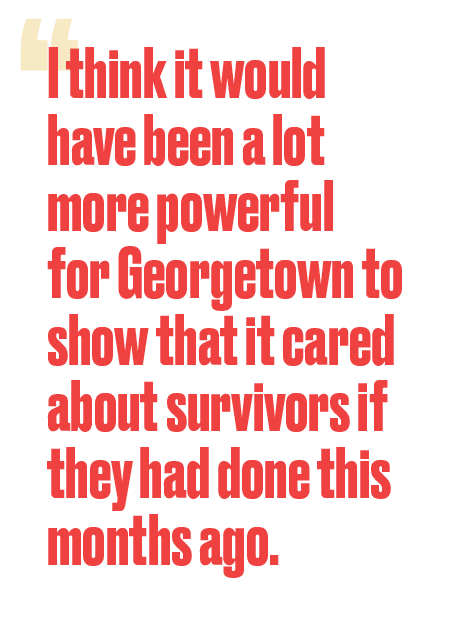
The scandal surrounding McCarrick and Wuerl continued to make the news during the months of those meetings. In October, the Vatican announced it was beginning a more in-depth investigation into McCarrick; Wuerl resigned from his position as archbishop of D.C.; and the Archdiocese of Washington identified 31 priests accused of sexual abuse over seven decades. That report prompted D.C. Attorney General Karl Racine to start an independent investigation of the Washington Catholic Church.
Bevilacqua remembered her frustration that, through this, the university still did not publicly comment on the status of the honorary degrees.
“Catholic and Fordham both rescinded the degrees they had given to Cardinal McCarrick—then Cardinal McCarrick, now just Mr. McCarrick—back in the summer,” Bevilacqua said. “And students have been asking the university to rescind these degrees since August, so this has been ongoing for months. The working group has existed since the fall. And we’ve received no answer in any of the communication that they’ve given us as to why this process has been so prolonged.”
In a Dec. 17 email, DeGioia informed students about four priests accused of sexual abuse in a Maryland Society of Jesuits that had spent time at Georgetown. DeGioia wrote that the university was committed to addressing sexual assault.
“Our community will continue our work to respond to this moment through dialogue, reflection, and action, building on the convenings we held this past semester, ongoing conversations with members of our community.”
***
There had been no further updates until the Vatican reported on Feb. 16 that McCarrick had been found guilty of multiple accounts of sexual abuse of minors and adults and was laicized—removed from the priesthood. This was the first time a cardinal has received such a punishment for sexual abuse. That day, Notre Dame rescinded McCarrick’s honorary degree.
Three days later, DeGioia announced that Georgetown would do the same in an email to the student body, the first time that the university has revoked an honorary degree.
The students who had been working towards this result expressed relief that McCarrick no longer holds an honorary degree but also qualified that relief with caution and lingering disappointment.
“While obviously this was a really necessary step for Georgetown to take, I think that its impact is really lessened by the fact that it took months of work to get there,” Bevilacqua said. “I think it would have been a lot more powerful for Georgetown to show that it cared about survivors if they had done this months ago.”
She added that DeGioia had not mentioned the status of Wuerl’s degree, and that there are other recipients of honorary degrees, particularly Charlie Rose, a former PBS host, who have also been accused of sexual assault. How the university continues to respond from this point, Bevilacqua believes, is intrinsically linked to its broader response to all interpersonal violence on campus. Laria said she hopes the working group and its upcoming recommendations become permanent fixtures of the university.
“Honorary degrees have some sort of meaning,” Laria said. “Georgetown is mirroring the secrecy and lack of transparency or community involvement that’s going on in the church that led to the sexual abuse crisis in the first place.”
On Feb. 21, Pope Francis opened a week-long meeting of bishops from around the world to investigate the scope of clerical sexual abuse. But in the wake of this global issue, Georgetown students are still left grappling with the university’s response to the crisis and the impact it has had on their relationship with the Catholic Church.
“It’s just a really intense feeling of disappointment and grief that these things continue to be covered up, year after year, and also just frustration in the time that it takes to resolve these problems or to discuss them,” Franz said. “As a young person growing up in this community, I want to see it be changed for the better and made into a safe, sacred place.”


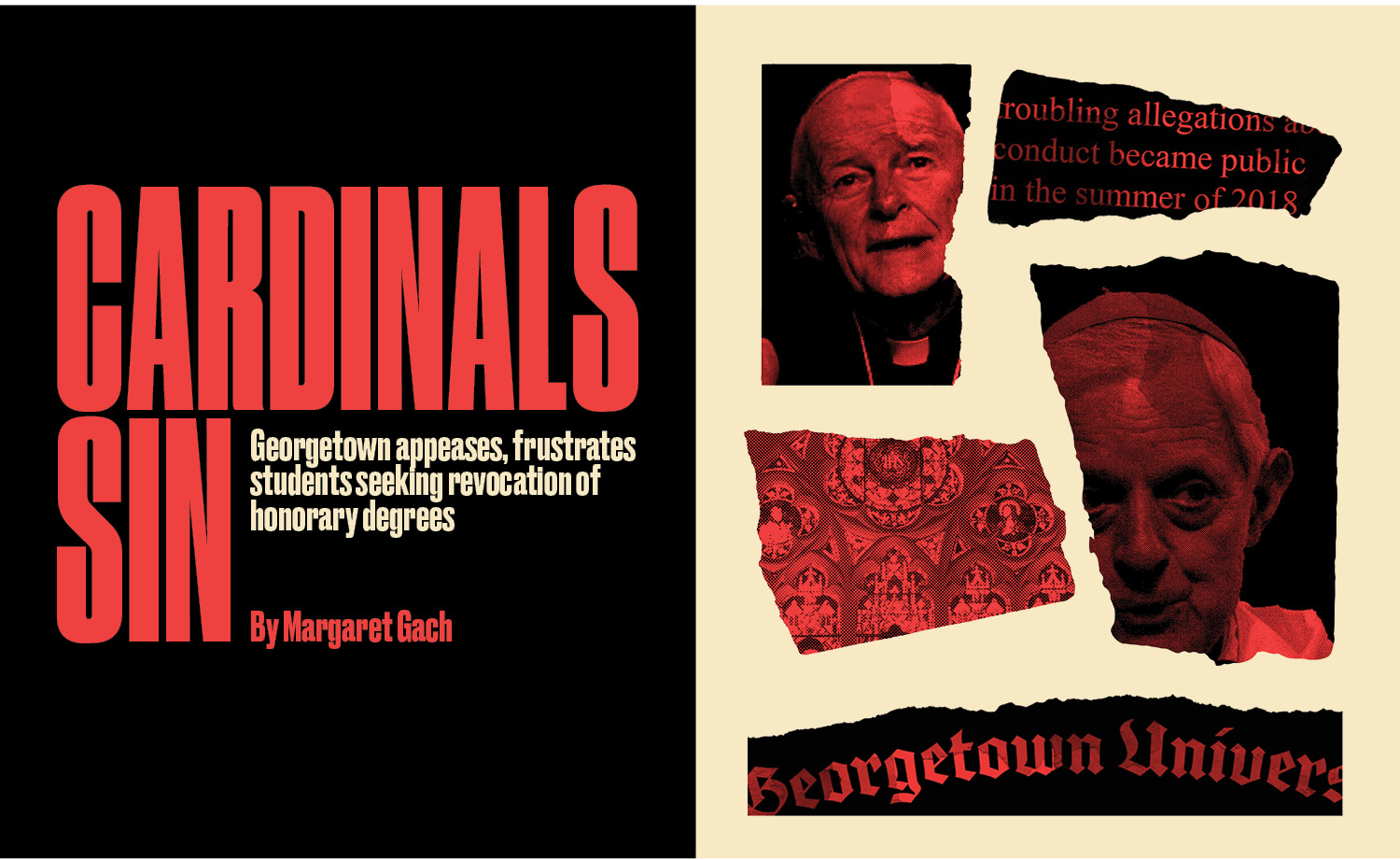

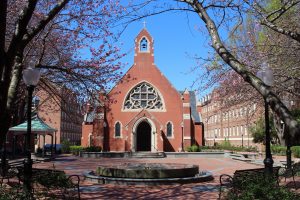
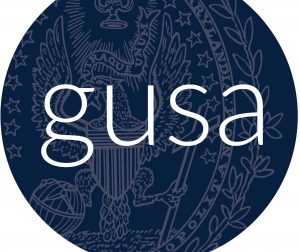
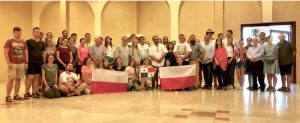
[…] both options are bad – so flamboyantly criminal a person. Throw in Georgetown’s difficulty breaking relations with a whole host of priestly sexual criminals on and around campus, and it makes UD wonder whether […]
[…] lots of pressure from students for it to revoke the honorary degree it gave to super-sexed Theodore McCarrick, a regular and adored presence in Georgetown’s chapels and classrooms. And so it […]